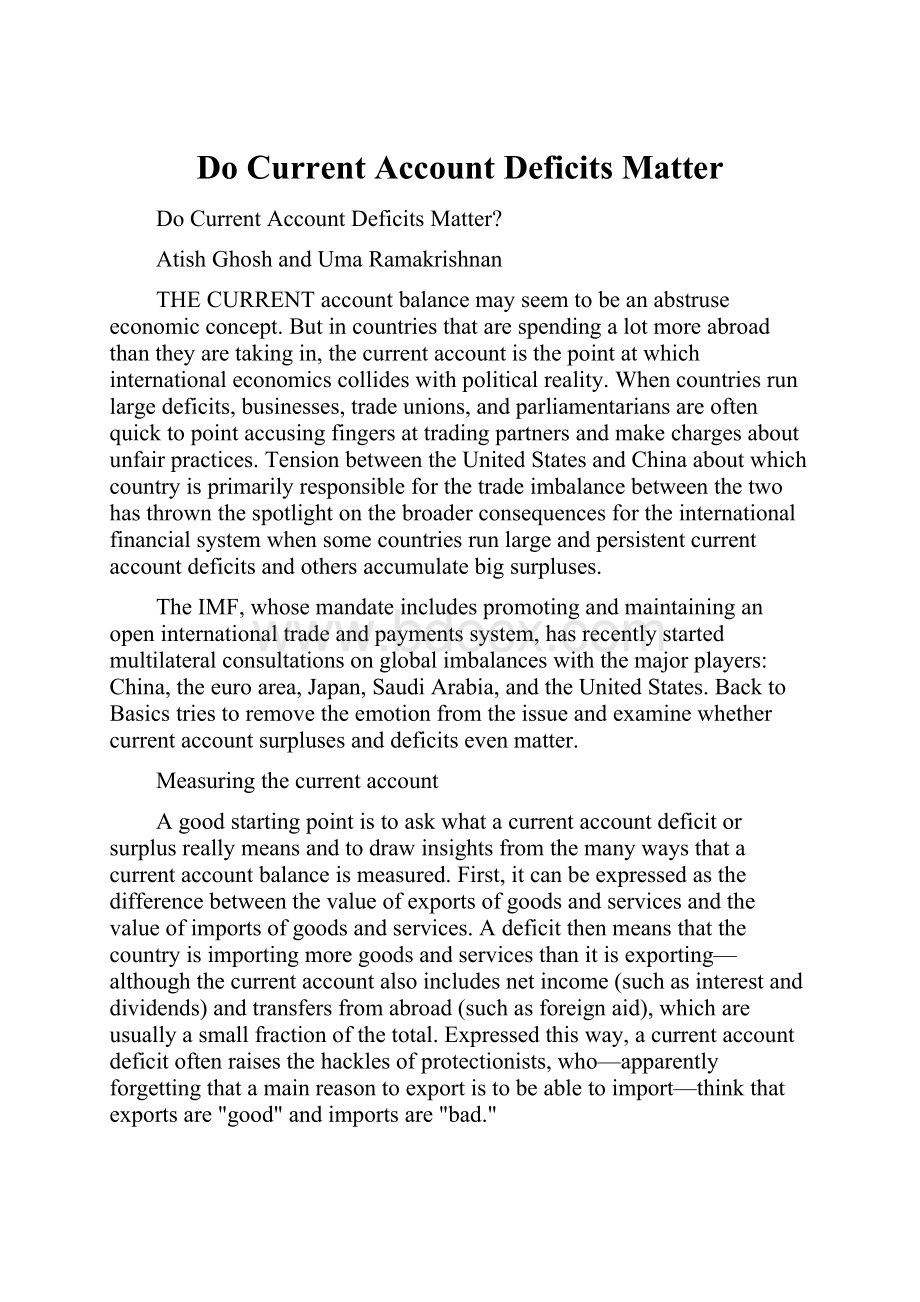Do Current Account Deficits Matter.docx
《Do Current Account Deficits Matter.docx》由会员分享,可在线阅读,更多相关《Do Current Account Deficits Matter.docx(11页珍藏版)》请在冰豆网上搜索。

DoCurrentAccountDeficitsMatter
DoCurrentAccountDeficitsMatter?
AtishGhoshandUmaRamakrishnan
THECURRENTaccountbalancemayseemtobeanabstruseeconomicconcept.Butincountriesthatarespendingalotmoreabroadthantheyaretakingin,thecurrentaccountisthepointatwhichinternationaleconomicscollideswithpoliticalreality.Whencountriesrunlargedeficits,businesses,tradeunions,andparliamentariansareoftenquicktopointaccusingfingersattradingpartnersandmakechargesaboutunfairpractices.TensionbetweentheUnitedStatesandChinaaboutwhichcountryisprimarilyresponsibleforthetradeimbalancebetweenthetwohasthrownthespotlightonthebroaderconsequencesfortheinternationalfinancialsystemwhensomecountriesrunlargeandpersistentcurrentaccountdeficitsandothersaccumulatebigsurpluses.
TheIMF,whosemandateincludespromotingandmaintaininganopeninternationaltradeandpaymentssystem,hasrecentlystartedmultilateralconsultationsonglobalimbalanceswiththemajorplayers:
China,theeuroarea,Japan,SaudiArabia,andtheUnitedStates.BacktoBasicstriestoremovetheemotionfromtheissueandexaminewhethercurrentaccountsurplusesanddeficitsevenmatter.
Measuringthecurrentaccount
Agoodstartingpointistoaskwhatacurrentaccountdeficitorsurplusreallymeansandtodrawinsightsfromthemanywaysthatacurrentaccountbalanceismeasured.First,itcanbeexpressedasthedifferencebetweenthevalueofexportsofgoodsandservicesandthevalueofimportsofgoodsandservices.Adeficitthenmeansthatthecountryisimportingmoregoodsandservicesthanitisexporting—althoughthecurrentaccountalsoincludesnetincome(suchasinterestanddividends)andtransfersfromabroad(suchasforeignaid),whichareusuallyasmallfractionofthetotal.Expressedthisway,acurrentaccountdeficitoftenraisesthehacklesofprotectionists,who—apparentlyforgettingthatamainreasontoexportistobeabletoimport—thinkthatexportsare"good"andimportsare"bad."
Second,thecurrentaccountcanbeexpressedasthedifferencebetweennational(bothpublicandprivate)savingsandinvestment.Acurrentaccountdeficitmaythereforereflectalowlevelofnationalsavingsrelativetoinvestmentorahighrateofinvestment—orboth.Forcapital-poordevelopingcountries,whichhavemoreinvestmentopportunitiesthantheycanaffordtoundertakewithlowlevelsofdomesticsavings,acurrentaccountdeficitmaybenatural.Adeficitpotentiallyspursfasteroutputgrowthandeconomicdevelopment—althoughrecentresearchdoesnotindicatethatdevelopingcountriesthatruncurrentaccountdeficitsgrowfaster(perhapsbecausetheirlessdevelopeddomesticfinancialsystemscannotallocateforeigncapitalefficiently).Moreover,inpractice,privatecapitaloftenflowsfromdevelopingtoadvancedeconomies.Theadvancedeconomies,suchastheUnitedStates,runcurrentaccountdeficits(seechart),whereasdevelopingcountriesandemergingmarketeconomiesoftenrunsurplusesornearsurpluses.Verypoorcountriestypicallyrunlargecurrentaccountdeficits,inproportiontotheirGDP,thatarefinancedbyofficialgrantsandloans.
Onepointthatthesavings-investmentbalanceapproachunderscoresisthatprotectionistpoliciesareunlikelytobeofmuchuseinimprovingthecurrentaccountbalancebecausethereisnoobviousconnectionbetweenprotectionismandsavingsorinvestment.
Third,thecurrentaccountcanbeviewedintermsofthetimingoftrade.Weareusedtointratemporaltrade—exchangingclothforwinetoday.Butwecanalsothinkofintertemporaltrade—importinggoodstoday(runningacurrentaccountdeficit)and,inreturn,exportinggoodsinthefuture(runningacurrentaccountsurplusthen).Justasacountrymayimportonegoodandexportanotherunderintratemporaltrade,thereisnoreasonwhyacountryshouldnotimportgoodsoftodayandexportgoodsoftomorrow.
Intertemporaltheoriesofthecurrentaccountalsostresstheconsumption-smoothingrolethatcurrentaccountdeficitsandsurplusescanplay.Forinstance,ifacountryisstruckbyashock—perhapsanaturaldisaster—thattemporarilydepressesitsabilitytoaccessproductivecapacity,thenratherthantakethefullbruntoftheshockimmediately,itcanspreadoutthepainovertimebyrunningacurrentaccountdeficit.Conversely,researchalsosuggeststhatcountriesthataresubjecttolargeshocksshould,onaverage,runcurrentaccountsurplusesasaformofprecautionarysavings.
Whenpersistentistoopersistent
Doesitmatterhowlongacountryrunsacurrentaccountdeficit?
Whenacountryrunsacurrentaccountdeficit,itisbuildingupliabilitiestotherestoftheworldthatarefinancedbyflowsinthefinancialaccount.Eventually,theseneedtobepaidback.Commonsensesuggeststhatifacountryfrittersawayitsborrowedforeignfundsinspendingthatyieldsnolong-termproductivegains,thenitsabilitytorepay—itsbasicsolvency—mightcomeintoquestion.Thisisbecausesolvencyrequiresthatthecountrybewillingandableto(eventually)generatesufficientcurrentaccountsurplusestorepaywhatithasborrowed.Therefore,whetheracountryshouldrunacurrentaccountdeficit(borrowmore)dependsontheextentofitsforeignliabilities(itsexternaldebt)andonwhethertheborrowingwillbefinancinginvestmentthathasahighermarginalproductthantheinterestrate(orrateofreturn)thecountryhastopayonitsforeignliabilities.
Butevenifthecountryisintertemporallysolvent—meaningthatcurrentliabilitieswillbecoveredbyfuturerevenues—itscurrentaccountdeficitmaybecomeunsustainableifitisunabletosecurethenecessaryfinancing.Whilesomecountries(suchasAustraliaandNewZealand)havebeenabletomaintaincurrentaccountdeficitsaveragingabout4½to5percentofGDPforseveraldecades,others(suchasMexicoin1995andThailandin1997)experiencedsharpreversalsoftheircurrentaccountdeficitsafterprivatefinancingwithdrewinthemidstoffinancialcrises.Suchreversalscanbehighlydisruptivebecauseprivateconsumption,investment,andgovernmentexpendituremustbecurtailedabruptlywhenforeignfinancingisnolongeravailableand,indeed,acountryisforcedtorunlargesurplusestorepayinshortorderitspastborrowings.Thissuggeststhat—regardlessofwhythecountryhasacurrentaccountdeficit(andevenifthedeficitreflectsdesirableunderlyingtrends)—cautionisrequiredinrunninglargeandpersistentdeficits,lestthecountryexperienceanabruptandpainfulreversaloffinancing.
Whatdetermineswhetheracountryexperiencessuchareversal?
Empiricalresearchsuggeststhatanovervaluedrealexchangerate,inadequateforeignexchangereserves,excessivelyfastdomesticcreditgrowth,unfavorabletermsoftradeshocks,lowgrowthinpartnercountries,andhigherinterestratesinindustrialcountriesinfluencetheoccurrenceofreversals.Morerecentliteraturehasalsofocusedontheimportanceofbalancesheetvulnerabilitiesintherun-uptoacrisis,suchastheextentofliabilitydollarizationandmaturitymismatches.Ithasalsounderscoredtheimportanceofthecompositionofcapitalinflows—forexample,therelativestabilityofforeigndirectinvestmentversusportfolioandothertypesofshort-terminvestmentflows.Moreover,weakfinancialsectorsoftenleadtohighervulnerabilitytoareversalasbanksborrowmoneyfromabroadandmakeriskydomesticloans.Conversely,aflexibleexchangerateregime,higherdegreeofopenness,exportdiversification,financialsectordevelopment,andcoherentfiscalandmonetarypoliciesaresomefactorsthatmakeacountrywithpersistentdeficitslessvulnerabletoareversal.
So,aredeficitsbad?
Acommoncomplaintabouteconomicsisthattheanswertoanyquestionis,"Italldepends."Itistruethateconomictheorytellsusthatwhetheradeficitisgoodorbaddependsonthefactorsgivingrisetothatdeficit,buteconomictheoryalsotellsuswhattolookforinassessingthedesirabilityofadeficit.
Ifthedeficitreflectsanexcessofimportsoverexports,itmaybeindicativeofcompetitivenessproblems,butbecausethecurrentaccountdeficitalsoimpliesanexcessofinvestmentoversavings,itcouldequallybepointingtoahighlyproductive,growingeconomy.Ifthedeficitreflectslowsavingsratherthanhighinvestment,itcouldbecausedbyrecklessfiscalpolicyoraconsumptionbinge.Oritcouldreflectperfectlysensibleintertemporaltrade,perhapsbecauseofatemporaryshockorshiftingdemographics.Withoutknowingwhichoftheseisatplay,itmakeslittlesensetotalkofadeficitbeing"good"or"bad":
deficitsreflectunderlyingeconomictrends,whichmaybedesirableorundesirableforacountryataparticularpointintime.
UnderstandingTheCurrentAccountInTheBalanceOfPayments
August182009|FiledUnder»Economics,Economy,FinancialTheory,Insurance,InternationalMarkets,Options
Thebalanceofpayments(BOP)istheplacewherecountriesrecordtheirmonetarytransactionswiththerestoftheworld.Transactionsareeithermarkedasacreditoradebit.WithintheBOPtherearethreeseparatecategoriesunderwhichdifferenttransactionsarecategorized:
thecurrentaccount,thecapitalaccountandthefinancialaccount.Inthecurrentaccount,goods,services,incomeandcurrenttransfersarerecorded.Inthecapitalaccount,physicalassetssuchasabuildingorafactoryarerecorded.Andinthefinancialaccount,assetspertainingtointernationalmonetaryflowsof,forexample,businessorportfolioinvestments,arenoted.Inthisarticle,wewillfocusonanalyzingthecurrentaccountandh